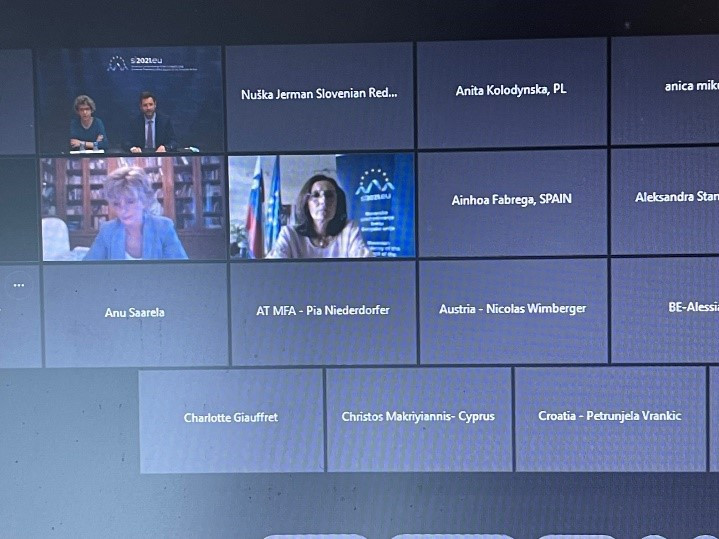Slovenia organises an event to mark the publication of the report on EU Guidelines on Promoting Compliance with IHL
- Ministry of Foreign Affairs
The panellists were E. Gilmore, EU Special Representative for Human Rights; A. Papaconstantinou, European Commission (Directorate-General for European Civil Protection and Humanitarian Aid Operations); R. Dariol, European External Action Service; and Dr C. Droege, Chief Legal Officer and Head of the Legal Division at the International Committee of the Red Cross. The discussion was moderated by Dr Marko Rakovec, Legal Adviser and Director-General for International Law and Protection of Interests at the Ministry of Foreign Affairs.
The event was attended by more than 100 participants, including IHL experts from EU member states (including Dr Anica Mikuš Kos, Ambassador Blanka Jamnišek and Ms Mateja Grašek) and from outside the Union (Acting Principal Legal Adviser of the USA and Switzerland), representatives of European institutions, humanitarian organisations, NGOs, experts at the Permanent Missions to the UN in Geneva and New York, and members of the Slovenian Permanent Coordination Group for IHL. The high number of participants reflects the interest of all stakeholders in strengthening the respect for international law on the ground.
The panellists highlighted in detail the numerous and diverse EU tools in the field of IHL: political dialogue with third countries, human rights dialogue with third countries, démarches, statements by senior EU representatives, sanctions, EU cooperation with international organisations, in particular the UN and regional organisations, and individual criminal liability. In practice, the European Union uses these tools against third countries that violate IHL rules and principles.
When attacks have been made on the integrity and reputation of representatives of the International Criminal Court, the EU has repeatedly highlighted the importance of independent and impartial action by the ICC through diplomatic and political tools. By doing so, the EU has further strengthened its commitment to respect for human rights, the rule of law, including respect for IHL – the fundamental concepts that paved the way for its development. Respect for IHL by states and non-state actors is at the heart of European humanitarian aid.
The EU also pays attention to preventive mechanisms, including EU education missions. These, in cooperation with the International Committee of the Red Cross, disseminate the knowledge on IHL and human rights law, in particular among military and police forces in selected third countries.
The EU has a number of tools at its disposal, but the panellists agreed that their abundance is not the decisive factor for effective IHL. They must be coherent, coordinated and complementary.
The Ministry of Foreign Affairs is holding this international event to pursue one of Slovenia's foreign policy objectives – respect for international law, including international humanitarian law which, given the situation in the international community, is a fundamental imperative.
The report is published on the website of the Council of the EU.


